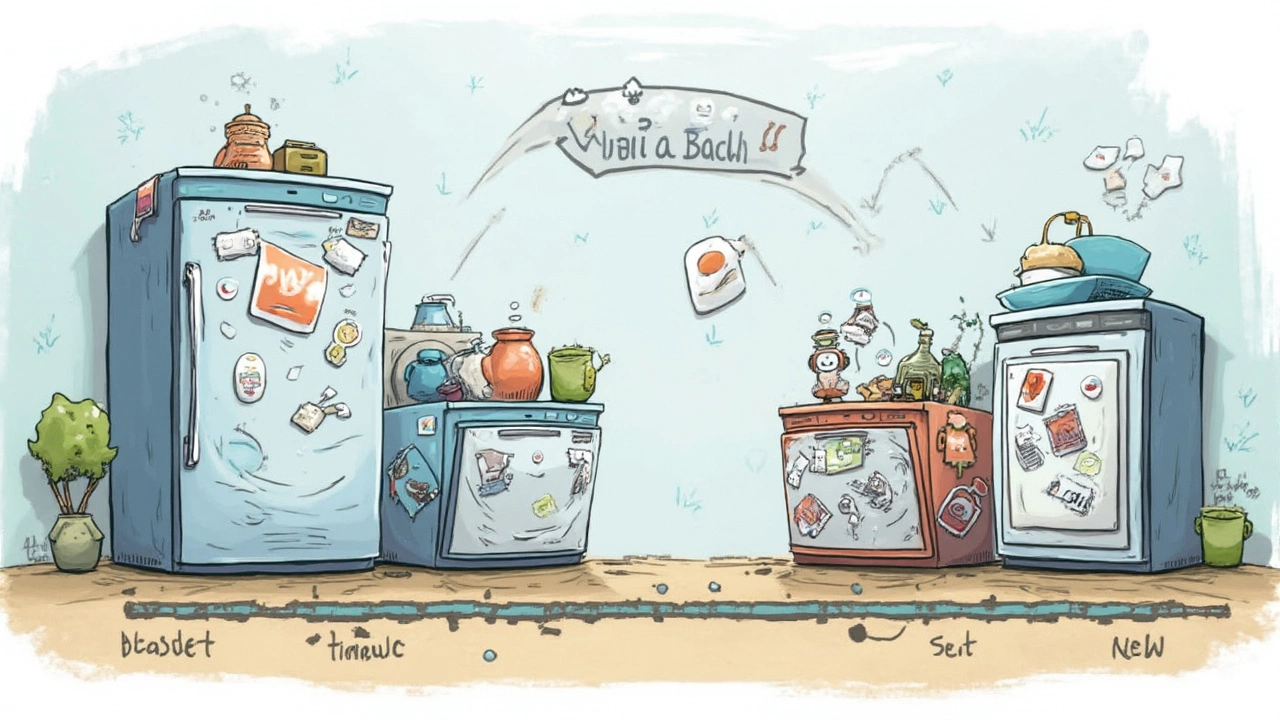Ever stared at your malfunctioning dishwasher and wondered if fixing it is worth the hassle? You’re definitely not alone in this dilemma. Dishwashers tend to breakdown at the most inconvenient times, transforming your kitchen into a puzzle of dirty dishes and stress.
But before you decide to chuck it and get a shiny new model, it's smart to weigh the costs. How much does fixing it really cost versus buying a new one? Typically, if repairs cost more than half the price of a new dishwasher, considering a replacement might be a better deal. But there's a sweet spot for repair if your dishwasher is less than 10 years old and the repair costs are reasonable.
Being familiar with what typically goes wrong can save a ton of money and extend the life of your dishwasher. Minor issues like clogged drains or faulty seals might be handled with a little DIY spirit. However, intricate problems, especially those involving wiring or the motor, are better left to the pros.
- Determining the Cost of Repair vs. Replacement
- Key Tips for Maintaining Your Dishwasher
- Common Dishwasher Issues You Can Fix
- When to Call in the Professionals
Determining the Cost of Repair vs. Replacement
Trying to figure out whether to repair or replace your dishwasher can feel like an endless loop. You’re looking at costs, age, and the likelihood of future breakdowns. So where do you draw the line?
The first step is to get a clear repair estimate. A good rule of thumb is the 50% rule: if a repair costs more than half the price of a new dishwasher and your appliance is over 8 to 10 years old, replacement might be your best bet. This is because newer models offer better energy efficiency and features that could save money and enhance convenience over time.
| Age of Dishwasher (Years) | Consideration |
|---|---|
| Less than 5 | Generally worth repairing |
| 5-10 | Depends on repair cost and condition |
| Over 10 | Probably time to replace |
Don't forget to consider the warranty. Many appliances come with warranties that might cover parts or repair service, especially if your dishwasher repair is needed within a specific timeframe – usually one to two years after purchase.
Additionally, think about hidden costs like the potential increase in energy bills if your current model is less efficient compared to newer ones. Replacement can become a financially savvy choice not just for repair costs but long-term savings, too.
In the end, weigh your options based on costs, how eco-friendly the new options are, and maybe even a touch of your personal annoyance level with cold, wet hands!
Key Tips for Maintaining Your Dishwasher
Keeping your dishwasher in top shape is easier than you might think, and doing so will save you from unnecessary dishwasher repair bills. Let's check out some straightforward steps you can take to keep it running smoothly.
First and foremost, clean the filter regularly. If your dishwasher’s filter is clogged, it’s like expecting a garden hose to work with the spout covered. Experts suggest rinsing it out at least once a month to avoid unwanted backups and ensure your appliance operates smoothly.
Next up, don’t forget to run your hot water before starting your dishwasher. This might sound odd, but giving your dishwasher a head start with hot water helps it clean more efficiently right from the get-go.
- Inspect the spray arms: Make sure they’re spinning freely and the holes are not blocked. It’s shocking how much gunk can accumulate and mess with their operation.
- Use the right detergent: Opt for detergents specifically made for dishwashers. Using regular dish soap can cause suds overload which is a total pain to clean up.
- Load dishes properly: It’s tempting to just throw everything in, but incorrect loading can block the detergent dispenser and affect cleaning performance.
And since we're talking longevity, here’s a fun fact—using your dishwasher regularly can actually prolong its life. A dishwasher that’s too idle can lead to dry seals, which might cause leaks down the road.
Maintenance Statistics:
| Dishwasher Component | Frequency of Check |
|---|---|
| Filter | Monthly |
| Spray Arms | Weekly |
| Detergent Cup | Bi-Weekly |
Finally, it’s not just about treating the dishwasher well, but also the cutlery and dishes inside. Run the machine on its hottest cycle at least once a week to help keep the interior clean and free of bacteria. Remember, a well-maintained dishwasher isn't just a win for your sanity—it's a money-saver in the long run.

Common Dishwasher Issues You Can Fix
Dealing with minor dishwasher troubles doesn't always require calling in the cavalry. Sometimes, a little elbow grease and some know-how can save you a good chunk of change. Let’s dive into some dishwasher repair fixes you can easily handle on your own.
First off, if your dishes aren’t getting as clean as they should be, check for a clogged spray arm. Often, food particles get stuck in the holes, causing uneven water distribution. Simply remove it and clean out the gunk. You'll be amazed at the difference!
Another issue is a dishwasher not draining properly. This might sound daunting, but it’s often just a blocked drain filter. Remove the filter and clear out any debris. You might even find that missing spoon you thought was lost forever!
If your dishwasher is leaking, a faulty door seal is a usual suspect. Over time, seals can tear or wear out. Replacing them is usually straightforward. Just make sure to get the right size.
"A well-maintained door seal is critical for efficient operation," says appliance expert Chris Clor. "They’re simple to replace but make a huge difference in preventing leaks."
- Tip: Always unplug your dishwasher before starting any DIY repairs to ensure safety.
- Use a soft toothbrush to clean spray arms and the drain filter.
- Check your dishwasher’s user manual for detailed steps on removing parts.
Remember, these small fixes not only keep your dishwasher running smoothly but extend its life, saving you from the hassle and cost of more significant repairs or replacements.
When to Call in the Professionals
So, you’ve tried your hand at fixing your dishwasher, but it's still acting up. Knowing when to throw in the towel and call the pros can save you time, frustration, and possibly extend your appliance's life.
First off, consider the age of your appliance. If your dishwasher is nearing a decade, more frequent problems aren't shocking. But if it's younger, severe issues need professional eyes. Major problems like a busted motor or electrical issues scream 'time for a pro'. Tinkering with these can lead to more extensive damage or, in a bad scenario, safety hazards.
Another thing to keep an eye on is certain recurring issues, like water leaking. An occasional leak? Maybe you can handle it. But persistent puddles are hints of deeper trouble only a professional can really nail down.
- Unfamiliar noises: If your dishwasher sounds like a construction site, it’s time for expert help. These sounds usually indicate failing parts.
- Water not draining: If water pools at the bottom and you've ruled out common clogs, you need someone who knows the inner workings to step in.
- No power: Outages or flickering? Electricity is best left to those who can say more than just 'Oops.'
Calling in experts could feel like a hit to the wallet, with some repairs averaging between $150-$400. But when weighed against letting an issue escalate, it might just pay off in the long run.
| Common Repairs | Approximate Cost |
|---|---|
| Pump replacement | $150 - $300 |
| Door repair | $50 - $125 |
| Heater fixes | $100 - $250 |
So, if DIY doesn't cut it, and especially if you’re dealing with risks you can't see, reach out to a professional. Trust the experts to have your dishwasher, and life, back on track.
